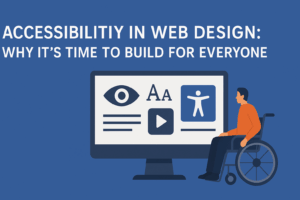In today’s digital-first world, accessibility is no longer a nice-to-have. It’s a must.
Web accessibility ensures that digital content is usable by all people, regardless of ability. For web designers and developers, that means following the Web Content Accessibility Guidelines (WCAG) to create experiences that are inclusive, intuitive, and compliant.
But accessibility isn’t just about doing the right thing — it’s also about meeting growing legal, business, and user demands.
The Rise in Legal Risk
Lawsuits targeting non-compliant websites have increased dramatically in the last few years, particularly in industries like healthcare, finance, and retail. As more services move online, organizations are being held accountable for ensuring that their digital experiences are usable by people with visual, auditory, cognitive, or physical disabilities.
Failure to comply with WCAG standards or the Americans with Disabilities Act (ADA) can lead to significant financial and reputational consequences. And retrofitting a non-compliant site after launch is often far more expensive than building it right from the start.
Accessibility Is Good UX
Accessible websites aren’t just better for those with disabilities — they’re better for everyone. Clear navigation, readable text, logical layouts, and keyboard operability benefit all users. Accessibility improves site performance, reduces bounce rates, and strengthens SEO — search engines reward websites that are easier to navigate and understand.
Designing with accessibility in mind leads to cleaner, more thoughtful user experiences. It reflects a brand’s commitment to equity and inclusion.
What Accessibility by Design Looks Like
Forward-thinking agencies are integrating accessibility into every phase of the project lifecycle:
-
Discovery and Strategy: Understanding your audience includes understanding their access needs.
-
Design: Prioritizing color contrast, text scaling, and consistent UI patterns.
-
Development: Ensuring semantic HTML, alt text, ARIA labels, and keyboard support.
-
Testing: Using automated tools and real user feedback to evaluate compliance and usability.
When accessibility is embedded in your design process — not tacked on later — it results in better outcomes for everyone.
Make Accessibility Your Competitive Edge
Whether you’re launching a new product or redesigning an existing platform, now is the time to ask: Is this experience usable by everyone who needs it?
At our agency, we believe accessibility isn’t an extra. It’s essential — for compliance, for usability, and for doing what’s right.
Let’s build a web that works for everyone. Contact us today to learn more and receive a no cost quote.

